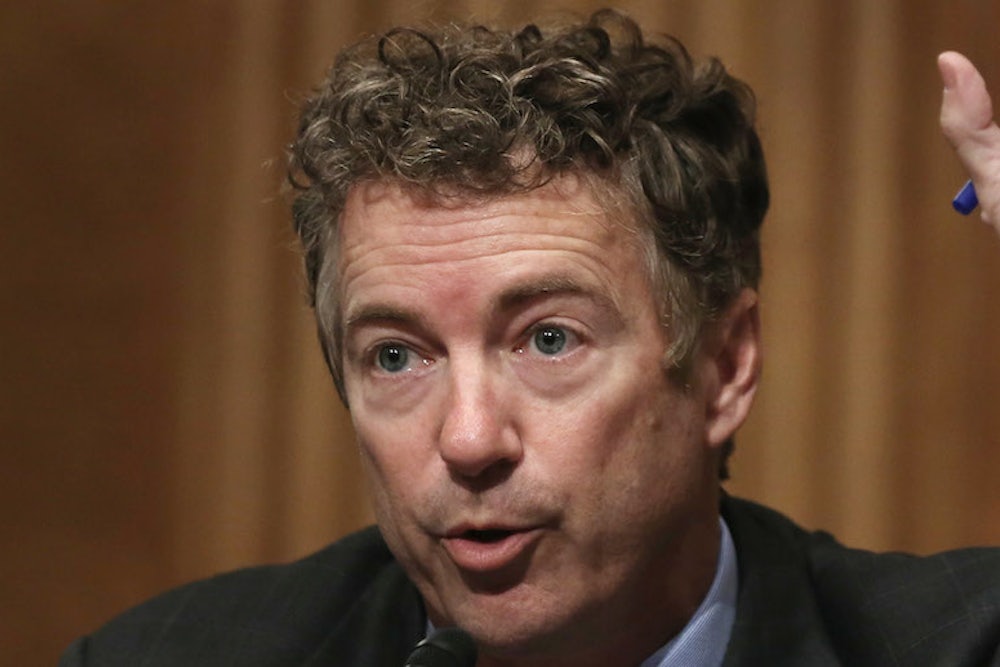The Rand Paul plagiarism scandal ground on Wednesday, with the conservative Washington Times announcing that, by agreement with the Senator, they were terminating his weekly column. The day before, he sat down with the liberal New York Times and promised structural changes in his office. He even apologized.
It's a strange turn for the cantankerous Senator from Kentucky. Just days before that, he whined about being singled out and being held to "a different standard" than everyone else. He complained about nefarious, nameless "haters"; then he challenged them to a theoretical duel.
The mere fact that Paul apologized, given that stubbornness to bow to the howling winds of the media, is exceptional.
Exceptional too is the fact that he apologized for this, but not for other significant missteps. This summer, when information surfaced that Jack Hunter, Paul's social media director, was also once, in very recent history, a shock-jock personality who wore a stars-and-bars mask and called himself the Southern Avenger, Paul—whose reluctance to throw staffers under the bus is one of his many stubborn ways of being not-your-average-politician—stood by him. “Are we at a point where nobody can have had a youth or said anything untoward?” he told the Huffington Post, adding that Hunter is "incredibly talented."
He did not apologize, he did not fire Hunter, he did not promise structural changes. "What am I supposed to do?" he said. "I'm going to have a lot of people working for me. They've all got writings and opinions." (Hunter quit two weeks after the scandal broke—and after it had died down.)
It's a strange, and glaring, discrepancy. Why does Rand Paul draw the line at intellectual dishonesty, but not at neo-Confederate nonsense?
The reason, it seems to me, lies less with any racism but more with the fact that he is a stubborn, ornery libertarian, the kind that is both self-consciously, ostentatiously principled, and intellectually insecure and with a keen persecution complex. Paul is often eager to flaunt his academic credentials and IQ, as well as the latest thing he happens to have read. The last time I saw him, for instance, he was touting a John Foster Dulles biography any time he was asked about foreign policy. And when I saw Paul at a Louisville Tea Party event for college students, he complained that “the media skewers you and makes you look like an imbecile or something because you made a mistake.” By way of a rebuttal to the media gods, he added, “It’s like, well, I did get into medical school and score at the top of my class. Somehow I did something right.”
As for the Hunter episode, it's worth looking back at another instance when Paul did not apologize: When he said on Rachel Maddow's show that he was not sure that the Civil Rights Act was a good idea in that it mandated to private businesses what they could and could not do. In fact, every subsequent time he was asked about it, including at two historically black colleges, he persisted in engaging in a discussion that was at once philosophically interesting and politically toxic. “He just wants to be Professor Rand,” one of his advisors told me. “He really got his nose bloodied on it, but he can’t nakedly pander. It’s just not him.”
This is consistent with the tradition he inherited from his father, who tolerated some fairly toxic and abhorrent types in orbit around him. Ever since Ron Paul got into politics in Texas in the late 1960's, he was surrounded by Birchers; later, he picked up Lew Rockwell and the types who penned pamphlets that ran some fairly incendiary stuff, including commentary on how blacks make good pick-pockets because they are "fleet-footed." The Elder Paul tolerated these types in part because libertarianism was an extremely fringe movement and you took whatever allies you could get, neo-Confederate or not. "That was kind of the world libertarians were stuck in," says Brian Doherty, an editor at Reason and author of a mammoth Ron Paul biography. And if you believe in absolute freedom, then you have to tolerate it.
There's no surer way to anger Rand Paul, in other words, than to impugn his intellect and its honesty. Part of his intellectual tradition, though, is to, worryingly, not always draw lines where the rest of us would hope a presidential hopeful would draw them. Another part of it is proving his presidential mettle to an equally defiant base that doesn't trust the media and will reflexively react against anything it puts forward. Thus Paul's revulsion with the scrutiny to which he will likely become more and more subject as he heads into 2016. It's all part of a whole: All ideas are worthy of discussion, even if they mightily offend people, even as we are ourselves mightily offended by any suggestion that we are in some way intellectually weak or, worse, dishonest.
It's a peculiar, prickly attitude, and Rand Paul is a peculiar, prickly man. And though he seems to be learning to grow a thicker skin—and to blunt some of those prickles—he still has a long way to go if he really wants to go for the White House.
